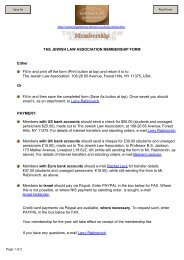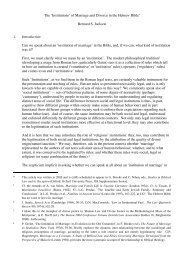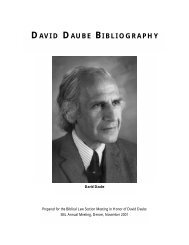Here - Deborah Charles Publications
Here - Deborah Charles Publications
Here - Deborah Charles Publications
Create successful ePaper yourself
Turn your PDF publications into a flip-book with our unique Google optimized e-Paper software.
- 31 –Amos Israel-Vleeschhouwer (Session 1)I offer to view the interaction of Jewish and other legal systems in two, intertwined, ways. Structural analysis: What is the extentof interaction and overlapping between the systems and between their constituencies? What are the power relations between thesystems (forced, acknowledged or accepted hierarchy and various non-hierarchical structures)? No interaction of the Jewish andanother legal system can be viewed in isolation. Jewish law, players and communities interact with multiple players in a complex,multi-layered system. I will offer a model for such an analysis and propose a research paradigm based on the model. Dynamicanalysis: The actual social and legal interactions, as well as their perception by all players should be researched as a process.Current interactions (or lack thereof) result from previous experience. As well, some interactions just occur, but other interactionsare strategically created, structured and managed by various players to achieve different goals. But, as in all complex systems, allinteractions have both planned and unsuspected consequences.What are the internal processes and institutions that regulate the interactions and that are activated by them? I suggest reexaminingsome images that have been offered in the Jurisprudential literature: the "bridge", legal transplantation (of trees andorgans), grafting, translation, dialogue and adoption. (Based on chapters 7-8 of my PhD thesis at TAU: "Attitudes of Jewish lawtowards international law: An analysis of Jewish legal materials and processes", supervised by Profs. Arye Edre'i and Orna BenNaftali, 2012).Amos Israel-Vleeschhouwer lives with his partner and four children in Jerusalem. He holds an MA in psychology andPhD in Law, both from Tel Aviv University. He researches Jewish law using legal research paradigms such as law andpsychology, law and space, public choice theory and system analysis. He teaches Jewish law, law and psychology, a legalclinical course and social psychology at various institutions. He is a co-founder and volunteer at the hotline for religiousmale victims of sexual abuse. For publications and drafts please contact aisrael@idc.ac.il.Bernard Jackson (Sessions 1 and 7)Bernard Stuart Jackson, b. 1944, holds degrees from Liverpool (LL.B. Hons), Oxford (D. Phil.), Edinburgh (LL.D.) andHebrew Union College, Cincinnati (D.H.L., honoris causa). He has held professorial posts at the Universities of Kent,Liverpool and Manchester (Co-Director of the Centre for Jewish Studies, 1997-2009; Director of the Agunah ResearchUnit, 2004-2009), and Visiting Appointments in Jerusalem, Oxford, Harvard, Paris, Bologna and Brussels. He is now(part-time) Professor of Law and Jewish Studies at Liverpool Hope University. His research interests (nine singleauthored books, including Wisdom-Laws (OUP, 2006) and Essays on Halakhah in the New Testament (Brill, 2008) are inthe semiotics of law and the history and philosophy of Jewish law. A full publicationslist is available at http://www.legaltheory.demon.co.uk/lib_biblioBSJ1.htmlLeah JacobsenLeah Jacobsen (Gordon College) – The Mother’s Legal Authority over Her Offsprings’ Marriage in the Ancient Near East and theBible (Session 4B)Mesopotamian and Biblical societies in antiquity were characterized by their patriarchal nature. The family unit was led by thefather whose authority enveloped many areas of life. The father had broad legal authority over the members of his household,including his offspring, his sons and his daughters, married and single. Therefore in those ancient writings, in which the patriarchalsystem is clearly regnant, one would expect the exclusive, or almost exclusive, presence of a dominant, authoritative father figure.However, Mesopotamian and Biblical texts, especially legal ones, attest that the father’s exclusiveness was not distinctive. In manysources, the mother was also mentioned in various contexts and in a number of different areas, primarily in those pertaining to heroffspring, such as, their marriage, their behavior towards her, their education, and her appearance in court on matters concerningthem. In this lecture I would like to address one aspect, which is the question of mother’s legal authority over her offsprings’marriage. I will discuss the following questions: Did the mother in Mesopotamia and Biblical Israel possess legal power over themarriage of her offspring, sons and daughters? Were the mother and father partners in making decisions regarding their offsprings’marriage? And if so, what was the extent of their partnership – full or partial?Sections in the 'Mesopotamian Law Collections' already from the second millennium BCE attest to the mother possessing





